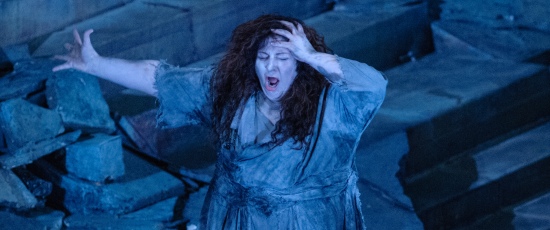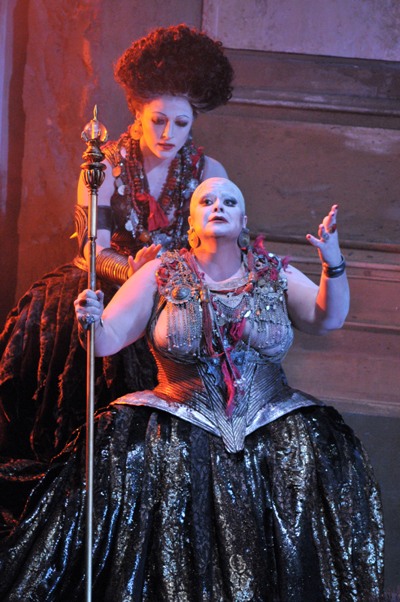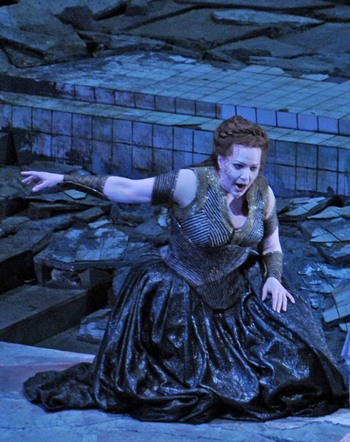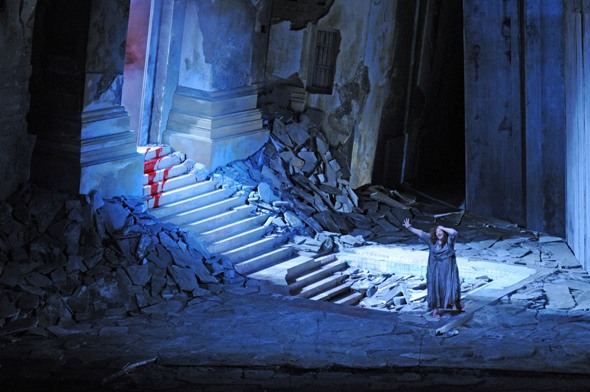Lyric Opera thriller: Christine Goerke probes the battered soul of Strauss’ vengeful Elektra
 “Elektra” by Richard Strauss, at the Lyric Opera of Chicago through Oct. 30 ★★★★★
“Elektra” by Richard Strauss, at the Lyric Opera of Chicago through Oct. 30 ★★★★★
By Lawrence B. Johnson
The Lyric Opera of Chicago opened its 2012-13 season Saturday night with a bracing new production of Strauss’ “Elektra” that fuses music and drama into an edge-of-the-seat theatrical thriller.
Making her Lyric Opera debut in the title role, soprano Christine Goerke delivered a sensational performance, not only dispatching the technical demands of Strauss’ formidable music but also probing into the heart and fury of a daughter bent on vengeance for the slaughter of her father and the faithlessness of her mother.
 Indeed the marvelous contributive elements of this production tumble upon one another. The supporting cast is superb and conductor Sir Andrew Davis keeps a keen musical tension on the entire enterprise, starting with his orchestra’s aggressive yet finely honed playing. Stage director Sir David McVicar shows us a charged but centered drama worthy of Sophocles, and designer John Macfarlane’s set – a broken, decaying palace – and his African-accented costumes complete a portrait of the depravity and despair that have settled over the house of murdered Agamemnon. All of which is bathed in the blood red and pallid white of Jennifer Tipton’s lighting.
Indeed the marvelous contributive elements of this production tumble upon one another. The supporting cast is superb and conductor Sir Andrew Davis keeps a keen musical tension on the entire enterprise, starting with his orchestra’s aggressive yet finely honed playing. Stage director Sir David McVicar shows us a charged but centered drama worthy of Sophocles, and designer John Macfarlane’s set – a broken, decaying palace – and his African-accented costumes complete a portrait of the depravity and despair that have settled over the house of murdered Agamemnon. All of which is bathed in the blood red and pallid white of Jennifer Tipton’s lighting.
It was Sophocles’ “Elektra” that provided the source for Hugo von Hofmannsthal’s concentrated one-act libretto, which Strauss transfigured in music that resonates of Wagner but also pushes the harmonic envelope toward the border of atonality soon to be crossed by Arnold Schoenberg. Perhaps inevitably, the harrowing music of “Elektra” quickly acquired the sobriquet of expressionist. While the tag seems to fit, the danger of taking it too uncritically lies in a conditioned expectation of general madness. “Elektra” is about many things – corruption, perversity, betrayal, vengeance – but insanity is not among them.
 Elektra, in Hofmannsthal-Strauss as in Sophocles, is obsessed with the idea of retribution, but – as conductor, director and soprano together argue with eloquence and conviction – she is not crazy. Her father, King Agamemnon, has come home from the Trojan War only to be murdered by his wife Klytämnestra and her lover Aegisth. When Elektra rebels against this new regime, condemning her mother, she is banished from castle comforts to live in the barn, though her more accommodating sister Chrysothemis remains in the good graces of mother and step-father. Meanwhile, Elektra helps to remove her brother Orest safely beyond the reach of Aegisth.
Elektra, in Hofmannsthal-Strauss as in Sophocles, is obsessed with the idea of retribution, but – as conductor, director and soprano together argue with eloquence and conviction – she is not crazy. Her father, King Agamemnon, has come home from the Trojan War only to be murdered by his wife Klytämnestra and her lover Aegisth. When Elektra rebels against this new regime, condemning her mother, she is banished from castle comforts to live in the barn, though her more accommodating sister Chrysothemis remains in the good graces of mother and step-father. Meanwhile, Elektra helps to remove her brother Orest safely beyond the reach of Aegisth.
The crumbling aspect of Macfarlane’s unit set seems in itself to trace that narrative. The very palace sits askew, whatever adornments it may once have displayed now reduced to rubble. Even the high walls of this citadel evoke not ancient glory but an unbearable claustrophobia. Red lighting of the interiors offers a pre-echo of the blood that ultimately will flow down an unwelcoming staircase. In the courtyard, a large square pit appears to be the killing ground where ever-fearful Klytämnestra makes her human sacrifices to indifferent gods.
When the opera begins, the passing of years have gone hard with Elektra. Tattered and filthy, tirelessly reviling her mother, she lives only for the return of Orest to kill Klytämnestra (mezzo-soprano Jill Grove) and Aegisth (tenor Roger Honeywell). The beauty – for that is the word – of Goerke’s performance is the preserved thread of humanity that runs through her portrayal. She brings shattering vocal power to Elektra’s rants, but when the beleaguered woman thinks of Orest, the solitary light that remains in her life, Goerke’s voice turns radiant, soaring to a glorious top.
 As her psychological foe, and brilliant musical counterpart, Grove offers a Klytämnestra tormented by fear and seeking absolution from her estranged daughter. Grove’s expressive singing catches just the right accent of terror mingled with overripe sweetness. Likewise, soprano Emily Magee’s vocally agile Chrysothemis is picture-perfect as the sister who yearns for normalcy and urges Elektra to accept present reality and end her grim vigil.
As her psychological foe, and brilliant musical counterpart, Grove offers a Klytämnestra tormented by fear and seeking absolution from her estranged daughter. Grove’s expressive singing catches just the right accent of terror mingled with overripe sweetness. Likewise, soprano Emily Magee’s vocally agile Chrysothemis is picture-perfect as the sister who yearns for normalcy and urges Elektra to accept present reality and end her grim vigil.
Orest does show up, of course, in the imposing vocal form of baritone Alan Held. The scene between Held’s long-awaited Orest and Goerke’s inexpressibly joyful Elektra is perhaps the musical highlight of this production, and it is certainly the dramatic apex. When the suddenly self-conscious Elektra shrinks from Orest, declaring that the wretched woman before him is no longer the sister he knew, Goerke imbues the moment with an honest sorrow – and a clear recollection — that removes any issue of madness. Hers has been a waiting game, almost beyond endurance and unspeakably painful.
Sir Andrew Davis’ minutely inflected account of Strauss’ music takes this “Elektra” to a special place. The work’s external intensity is only redoubled by the finesse with which Davis negotiates its psychological interiors. And the Lyric Opera Orchestra’s well-muscled yet evocative performance does regal service to a composer who in this opera transmuted the symphonic poem into the essence of Greek tragedy.
Related Links:
- “Elektra” synopsis and characters: Find it at OperaToday.com
- Performance location, dates and times: Details at LyricOpera.org
- Lyric’s new season offers scenic route with nine stops: Read preview at ChicagoOntheAisle.com
Photo captions and credits: Home page and top: Christine Goerke as Elektra. Descending: Klytämnestra (Jill Grove) has an uneasy grip on her royal staff. Emily Magee portrays Elektra’s sister Chrysothemis. It is a rapturous reunion for Elektra (Christine Goerke) and her brother Orest (Alan Held). Below: Chrysothemis (Emily Magee) implores her sister Elektra (Christine Goerke) to follow a more reasonable course. Elektra (Christine Goerke) exults in her blood-splashed revenge. (Photos by Dan Rest)
Tags: Alan Held, Christine Goerke, Emily Magee, Hug von Hofmannsthal, Jill Grove, John Macfarlane, Richard Strauss, Sir Andrew Davis, Sir David McVicar




2 Pingbacks »